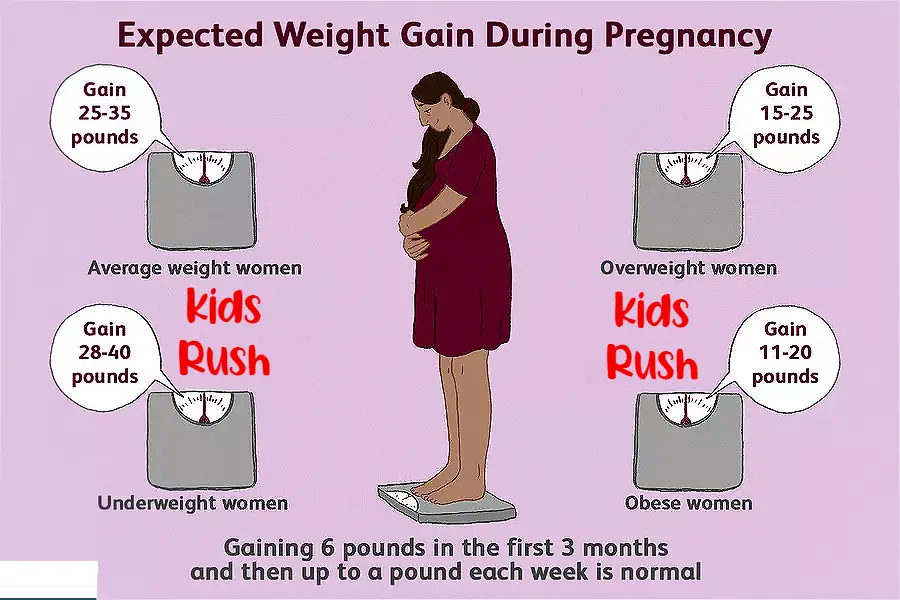Healthy and comfortable pregnancies can be achieved through good nutrition. As well as improving your overall health, it can reduce pregnancy complications, such as anemia and morning sickness, and reduce your chance of constipation. Your growing baby also benefits from proper nutrition.
You can provide your child with all the essential nutrients he or she requires. A healthy birth weight greatly increases the chances of your baby having fewer congenital anomalies.
The consequences of poor nutrition during pregnancy
The opposite can happen if you do not get adequate nutrition during pregnancy. Poor eating habits can lead to the following:
- Birth defects
- Intrauterine Growth Restriction (IUGR)
- Complications during pregnancy
- Premature delivery
- Congenital defects
- Miscarriage
- Chronic illness after birth
- The death of the mother or child

It’s a good idea to follow your doctor’s instructions regarding diet and weight gain during pregnancy. This will increase your chances of having a healthy pregnancy and a healthy child. This information will give you tips and advice on staying healthy during pregnancy, including what you should eat and how much weight you should gain.
Prenatal Care
Getting prenatal care early and regularly is essential to monitor your nutrition, weight gain, and overall health during pregnancy. It is more likely that you will gain the recommended amount of weight during pregnancy if your doctor gives you good advice on a proper diet. The doctor will monitor any health conditions that may impact your nutritional well-being during your prenatal visit to prevent complications.
The following factors can influence your nutritional health:
- Pre-pregnancy weight
- Pre-pregnancy health
- Your age
- Socioeconomic status
- Smoking
- How many times you’ve been pregnant
- Use of alcohol
- Diabetes
- High blood pressure
- Use of drugs
- Kidney disease
- Cancer
- Infectious diseases such as HIV
- Heart disease
- Depression
Severe Morning Sickness
During the first trimester of pregnancy, morning sickness is common. Talk to your doctor about your symptoms, but mild nausea and vomiting are usually not a big deal. A few pregnant women experience severe nausea and vomiting, however. Pregnancy-induced nausea and vomiting, or hyperemesis gravidarum, is an unpleasant experience.
Dehydration and weight loss are common complications of hyperemesis gravidarum. Hospital care is generally provided to pregnant women with hyperemesis gravidarum so that they can receive IV fluids and medication. Your nutrition can be maintained so that your baby is not hurt by the treatment. You and your child can suffer serious health consequences if you do not treat excessive nausea and vomiting.
Weight Gain
How much weight you gain during your pregnancy and your pre-pregnancy weight impact:
- Your baby’s development and growth
- How to stay healthy during pregnancy
- Delivery and labor are your responsibility
- Birth weight of your baby
- Your baby’s long-term health
According to your body mass index (BMI) and how much weight you weigh when you become pregnant, your doctor will advise how much weight you should gain. Generally, you should follow these guidelines:
- The ideal weight gain for women is 25 to 35 pounds.
- The ideal weight gain for underweight women is 28 to 40 pounds.
- Women who are overweight should try to gain no more than 15 to 25 pounds.
- Weight gain for obese women should be limited to 11 to 20 pounds.
During the first three months of pregnancy, healthy women should gain approximately six pounds, then 0.5 to one pound per week until delivery.
Underweight
Low birth weight and premature birth can occur if the mother is underweight before pregnancy or doesn’t gain enough weight during pregnancy. Those born with low birth weight can be more likely to develop health problems such as heart disease, hypertension, diabetes, and some types of cancer later in life.
Overweight
Weight gain during pregnancy or being overweight before getting pregnant can also result in problems. Overweight and obesity have several complications, including:
- Hypertension
- Gestational diabetes
- The preeclampsia condition
- Preterm labor
- Delivery by C-section
- Maternal and neonatal health issues that last beyond pregnancy
Obese mothers tend to have more babies with childhood obesity, which is accompanied by chronic diseases.
Eating Right

Pregnant women of average weight will need to consume approximately 300 extra calories daily during their pregnancy. The temptation to eat junk food during pregnancy is appealing to some women. Getting enough calories is important, but choosing the right type is equally important. When you’re pregnant, you don’t have to limit your intake of sweets and junk food, but you want to be sure that the nutrients your body and your growing baby need are not compromised.
You should eat foods from all food groups, and consume calories from:
- Safe seafood
- Lean meats
- Fresh fruit
- Vegetables
- Whole grains
- Nuts
- Healthy Fats
- Dairy products
You May Like Also
- Is It Safe to Eat Ice Cream During Pregnancy?
- Is It Safe To Eat Calamari During Pregnancy?
- Can Women Eat Honey While Pregnant?
Vitamins & Nutrients
The diet you follow should provide you with the vitamins and minerals your baby and you need to remain healthy, but you should pay special attention to the following nutrients if you’re pregnant:
Folic Acid: (Folate) is a B vitamin that can be found in natural forms. As well as preventing birth defects such as spina bifida, pregnancy complications can also be prevented through it. Chickpeas, spinach, avocados, broccoli, and lentils are naturally high in folate, which is fortified in bread and cereal.
Docosahexaenoic acid (DHA): DHA belongs to the omega-3 fatty acid family. Babies’ brains and eyes develop due to it. DHA is found in oily fishes such as salmon, tuna, and halibut, as well as eggs and fortified foods, which are good sources of DHA.
Iron: During the making of red blood cells, iron is used in your body. Iron is essential during pregnancy to prevent anemia, as well as to help build up a healthy blood supply for the unborn child. There are several foods high in iron, including meat, liver, fish, beans, leafy green vegetables, whole grains, and nuts. When you are not getting enough iron or when your blood tests show you need more, your doctor may prescribe an iron supplement.
Calcium: You need calcium for the development of your baby’s teeth and bones. In addition to its important role in the heart and nervous system, calcium is also an essential nutrient. A calcium-rich food, such as orange juice, can also be obtained from dairy products, such as milk and cheese. It is possible to take a supplement if your diet does not provide enough.
Vitamin D: Together, vitamin D and calcium contribute to bone health. The teeth and bones of a developing baby are strengthened by these minerals. In addition to its role in the eyes and skin, vitamin D is an essential nutrient. If you spend time in the sun or drink fortified milk, you can get Vitamin D. We recommend you to read our article which is about Vitamin D Deficiency In Children.
Prenatal Vitamins: Your daily diet alone may not provide you with all the recommended nutrients, so you should take a prenatal vitamin as well. As well as calcium, folic acid, vitamin C, and other vitamins and minerals, prenatal vitamins also provide other aids to the body. Healthy eating is not replaced by a prenatal vitamin. With it, you can get all the nutrition you need for you and your baby along with the healthy foods you eat.
Related
Fluids
Water is essential for you and your baby. It is recommended that you drink between eight and ten eight-ounce glasses of water or other fluids per day to keep healthy and hydrated. You may need more if you exercise or if it’s extremely hot out. Drinking beverages such as the following will help you meet your fluid requirements daily:
- Water
- Fruit juice
- Milk
- Soups
- Ice tea
- Hot tea
Generally, you should limit the number of sugary drinks and caffeine you consume.
Nutrition Tips During Pregnancy
Some women have an easy time adjusting to pregnancy because they always eat well. It is difficult for some women to change their eating habits and stick with a healthy diet. However, you do not need to be perfect. You will be well on your way if you listen to your doctor and follow his advice to the letter. For your health during pregnancy, we have provided a few nutritional tips.
- To maintain your nutritional health, weight gain, and general health throughout your pregnancy, you should consult your physician early and often.
- If you want to avoid pregnancy complications, start taking folic acid supplements before you conceive. Take folic acid and eat foods rich in folate throughout your pregnancy.
- Iron-rich foods should be consumed during pregnancy. Vitamin C can also help your body absorb iron more effectively when combined with iron-rich foods.
- Don’t forget to take your prenatal vitamin as well as anything else your doctor prescribes.
- Weight gain should be based on your BMI and your physician’s recommendations.
- Eat regularly and avoid fasting. Instead, have five meals or snacks throughout the day.
- If you’re feeling tired, rest for a while. Stress and fatigue will be reduced with this treatment.
- Drink plenty of fluids, especially water, to keep your body hydrated.
- Diabetes and high blood pressure are considered health conditions that may require additional diet advice. See a dietitian, nutritionist, or doctor.
- Try to stay as active as possible if your doctor approves. As long as you’re not experiencing any pregnancy complications, mild to moderate exercise is usually well tolerated. Yoga is also beneficial during pregnancy.
- During your pregnancy, you can seek support from your family and friends, or join online or in-person groups to get the support you need. Staying on track while pregnant can be made easier by exchanging delicious, healthy recipes.
- Try not to drink alcohol or take drugs while you are pregnant, and stop smoking if you do.
- Whenever you have questions about your diet or health, you should speak with your doctor.
A Word From Kidsrush.com
Good nutrition is important for health during pregnancy and can help mothers and babies experience a more comfortable and safe pregnancy. Having a perfect diet may be difficult all the time, and chances are once you find out you’re expecting you might need to make some changes to your existing diet. Taking care of your diet, seeking medical treatment for weight gain, taking prenatal vitamins, and staying away from alcohol, drugs, and smoking will put you on the right path to a healthy pregnancy.
